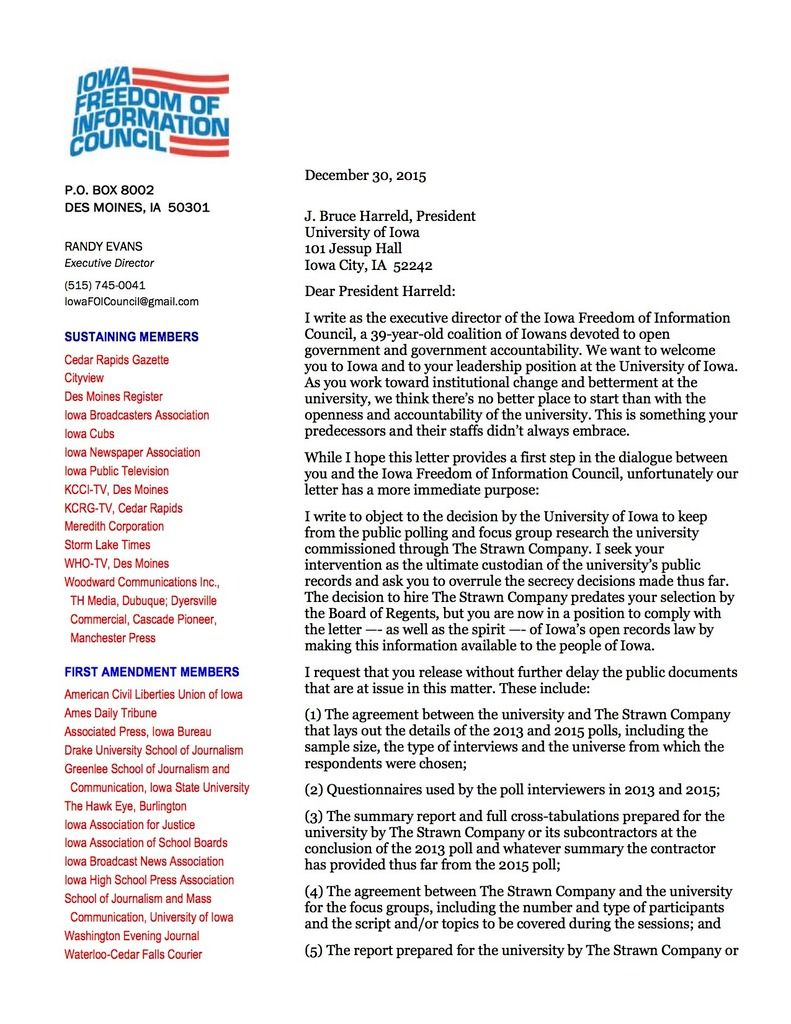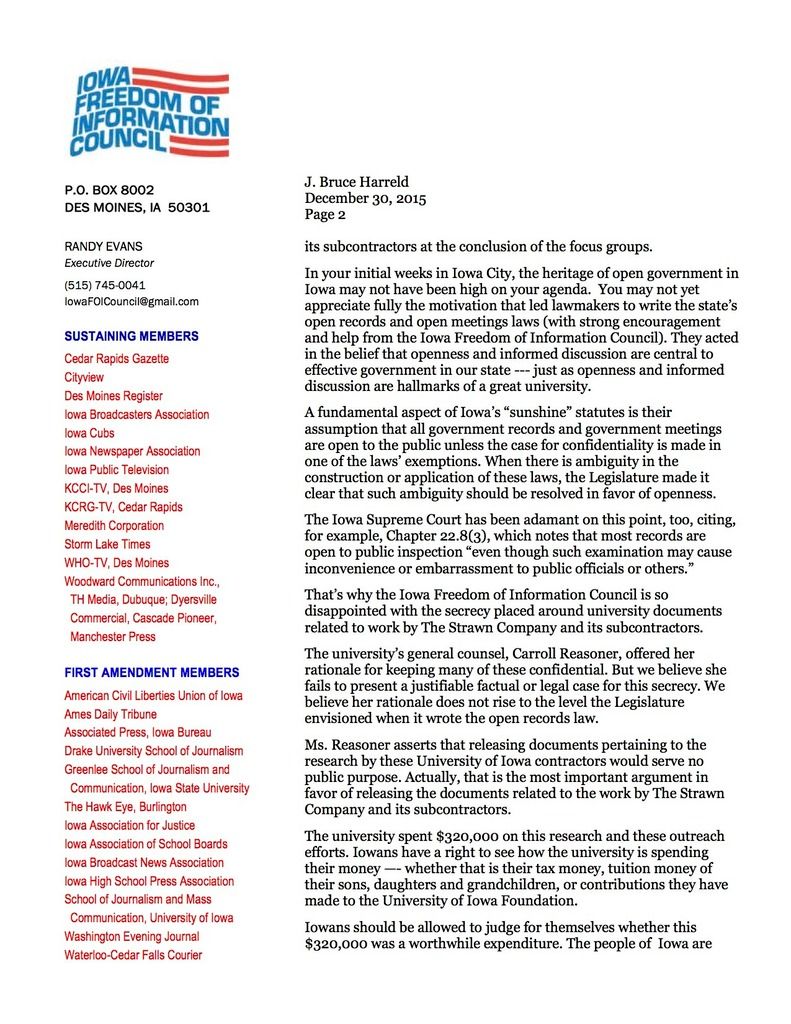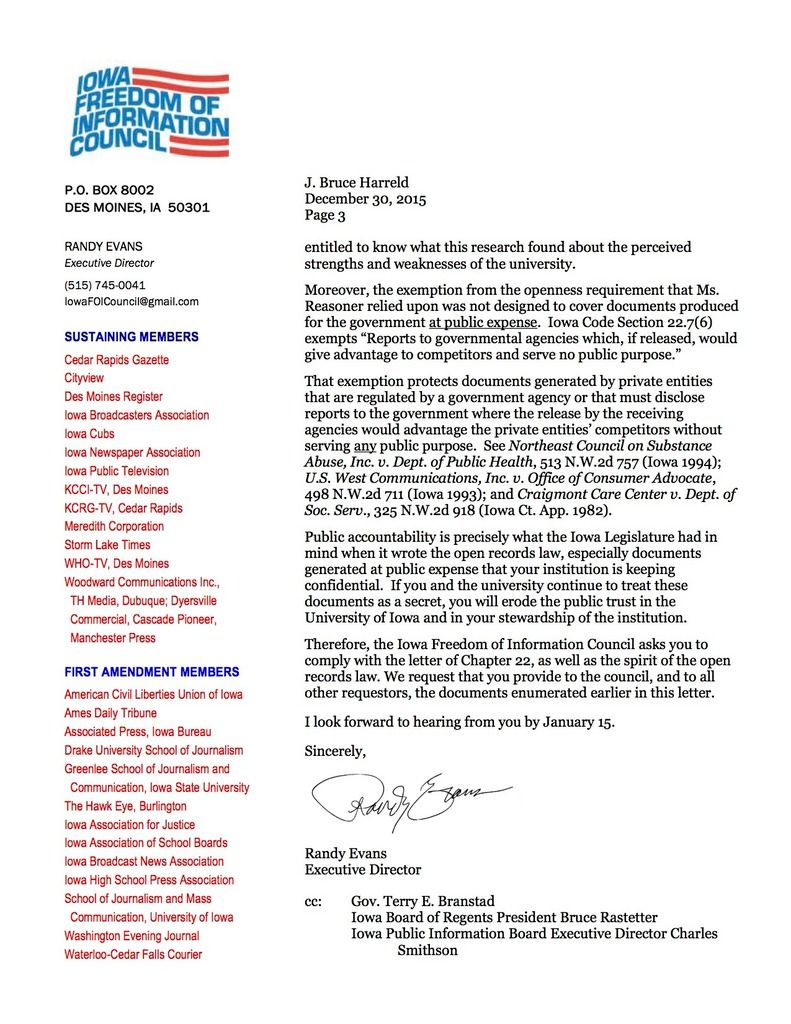After a contentious recent e-mail exchange with a prominent alumnus, University of Iowa President Bruce Harreld vowed that he will “continue to respond to his critics via email,” because “I value direct and candid feedback from our students, faculty, staff, and alumni and if I stop responding I won’t be the kind of president this institution needs and deserves.”
That sentiment doesn’t apply to all critics, though. Iowa Freedom of Information Council Executive Director Randy Evans had received no reply from Harreld more than two weeks after urging him to release documents related to a statewide opinion poll and other work the University of Iowa awarded through no-bid contracts to a company owned by former Iowa GOP Chair Matt Strawn.
Bleeding Heartland was first to report on the poll that tested messages and attitudes about the University of Iowa, as well as respondents’ views of Harreld himself. University officials confirmed that a marketing survey had sampled Iowans in November but declined my repeated requests for details on the poll’s methodology, a copy of the questionnaire, the summary polling memo, full results and cross tabs, and questionnaires and results from similar polls taken in previous years.
Ryan Foley of the Associated Press was likewise rebuffed when seeking information about the same poll. His review of some related documents showed that the university “has quietly awarded several no-bid contracts totaling $321,900 to a prominent GOP consultant [Strawn] for polling and social media services often delivered through subcontractors.” But officials continued to withhold from the AP various materials related to Strawn’s work, claiming Iowa Code Chapter 22.7 (6) allows “Reports to governmental agencies” to remain confidential if their release “would give advantage to competitors and serve no public purpose.”
Enter Randy Evans, the Des Moines Register’s longtime opinion editor (now retired). He wrote to Harreld on behalf of the Iowa Freedom of Information Council on December 30. Evans asserted that the university’s general counsel failed “to present a justifiable factual or legal case for this secrecy,” and that “her rationale does not rise to the level the Legislature envisioned when it wrote the open records law.” Citing Iowa Supreme Court and lower court rulings, Evans argued persuasively that the exemption “was not designed to cover documents produced for the government at public expense.” He also explained why Iowans have a right to know the details about how $320,000 was spent on research and outreach for a public institution. Evans urged Harreld to comply with “the letter of Chapter 22” and “the spirit of the open records law,” releasing the documents in question to the Iowa Freedom of Information Council and “all other requestors.” I enclose below the whole letter; you can find the pdf file here. Evans asked Harreld to reply by January 15.
Although Harreld has replied to some critics in less than a day, and occasionally within hours of receiving the correspondence, Evans reported on January 16 that Harreld had not responded to his letter.
Rather than dodging Evans, Harreld should explain why he prefers for the university to keep these documents secret. A few possible explanations come to mind, grounded in political considerations rather than Iowa law. Maybe Harreld would rather not disclose what poll respondents thought about his job performance or the value of a degree from the University of Iowa. Maybe releasing the documents would embarrass the university by revealing that Strawn’s company contributed little, if anything, to the work product. (Foley reported that “Joseph Brennan, the university’s recently departed vice president of strategic communication, said he never heard Strawn’s name during his two-year tenure.”) Maybe Harreld is protecting the university’s Vice President for External Relations Peter Matthes, who awarded and managed the no-bid contracts to Strawn’s company. Matthes was present at Harreld’s secret meeting in early June with Iowa Board of Regents President Bruce Rastetter and Vice President for Medical Affairs Jean Robillard, who led the university’s presidential search committee.
If Harreld has a legitimate reason for withholding materials related to Strawn’s work for the university, let’s hear it. Ignoring a well-reasoned letter from the executive director of an established, statewide non-profit organization doesn’t reflect “the kind of president this institution needs and deserves.”
P.S.-In the enclosed letter, Evans refers to opinion polls from 2013 and 2015. University spokesperson Jeneane Beck told me the annual marketing survey is conducted in November in odd-numbered years and in December in election years. I infer a similar poll was conducted in December 2014. Its questionnaire and findings should also be included in the document request.
UPDATE: Jeff Charis-Carlson reported for the Iowa City Press-Citizen on January 19,
UI officials said Tuesday that the letter had been received through the mail but had not been opened immediately because of a number of complicating factors — including the monthlong break between classes, several staff members being reassigned during the holidays and the fact that the letter had been sent while Harreld and other UI officials were in California for the Jan. 1 Rose Bowl.
“(President Harreld) has the letter now, and and we will respond directly to the Iowa Freedom of Information Council,” UI spokeswoman Jeneane Beck said Tuesday.
Harreld has been back in the office for some time since the Rose Bowl, so I am surprised to hear that no staffer got around to opening all of the mail that came in for him during the holiday break. In any event, I look forward to reading his response.
SECOND UPDATE: I asked Beck on January 19 whether an entire batch of mail was left unopened in the president’s office following the winter vacation or whether the letter from Evans somehow slipped through the cracks. She replied by e-mail on January 20,
The president’s office was closed for a few weeks for minor renovations including asbestos removal. During that period of time the mail was picked up on January 6th and January 15th, when the office was reopened prior to the start of the spring semester. The letter was not in the batch of mail picked up on the 6th but was in the batch picked up on the 15th.
I would have expected a letter mailed from central Iowa on December 30 or 31 to reach the president’s office in Iowa City by January 6. Maybe mail distribution within the university is slower during the semester break.
I have requested copies of Harreld’s reply to the Iowa Freedom of Information Council and any supporting documents he may attach to the correspondence with Evans.





4 Comments
Nobody opened the mail?
I’m not saying it’s impossible, but if it’s true that’s a terrible business practice for the president’s office of a Tier 1 research university. Is non-responsiveness considered good business practice out in the corporate world where Mr. Harreld is from?
rosalita Tue 19 Jan 1:15 PM
it's hard for me to believe
a stack of mail from just before New Year’s was left unopened. I suppose an oversight could have happened.
desmoinesdem Tue 19 Jan 1:49 PM
Campus mail IS incredibly slow
It is actually not at all unlikely that something mailed Dec. 30 would not have arrived at the President’s office before Jan. 6. But that still doesn’t explain why no one thought it was important to check for mail to the President more often than every 8 or 9 days. That’s just inexcusable to me.
rosalita Wed 20 Jan 2:43 PM
Corruption corrupts
Lies upon lies,. covering the cover-up. Harreld has no idea what to do as a president. However his cronies and the political operative do: bleed the treasury dry, even if it includes students monies.
This nonsense is going to continue as long as Branstad is Gov., Rastetter is on the BOR, and Harreld and the political operatives run the educational system.
Just waiting for everyone to start blaming Obama or the EPA or something like that in Flint MI…
vt Thu 21 Jan 7:31 PM